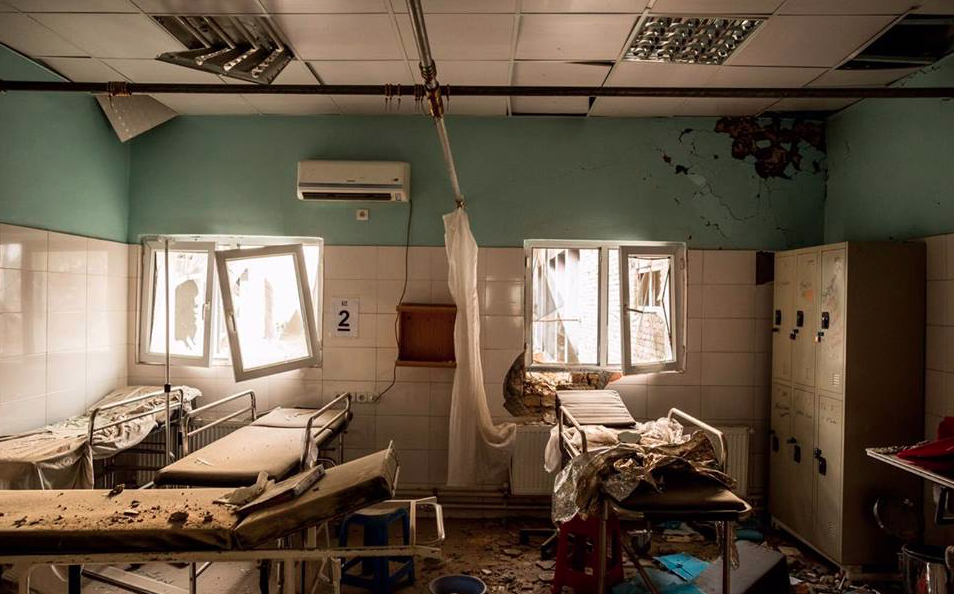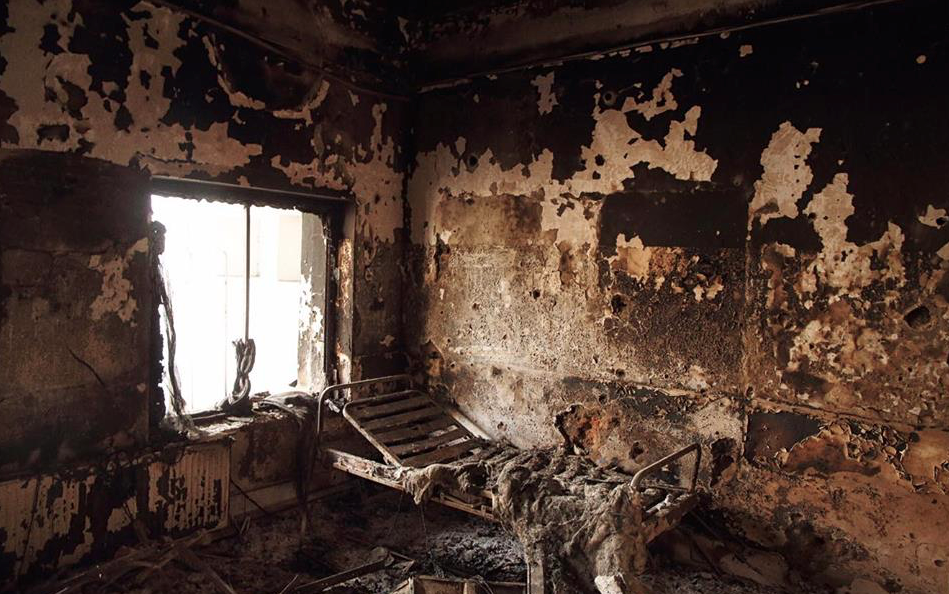‘The city was once again back in the hands of the Taliban’
On October 3, 2015, a hospital run by Medecins Sans Frontieres (Doctors without Borders, or MSF) in Kunduz, Afghanistan was struck repeatedly by US military aircraft; 42 lives were lost in the mistaken dawn assault. Dr. Evangeline Cua, a Filipino field surgeon with MSF, survived the horrifying ordeal. This is her story.
PART 2
Last-minute instructions were being given to us.
“… car doors … windows unlocked … jump … car … stray bullets. No … contact … stopped … the way.” I couldn’t concentrate. The voice drifted in and out of my consciousness. My stomach was growling and I hadn’t had any sleep since last night.
“Okay?” Four heads simultaneously nodded. I was hardly paying attention and heard only half of what the field coordinator was saying. Trying to fix my head scarf with one hand, I was also busy writing a message to send back home.
Surgical team going to the hospital. No wifi there. Will call once I’m
back in the staff house. Tell mom and dad not to worry. We’re safe. :)
Message sending failed.
Message sending failed.
Message sending failed.
Darn! Securing my backpack, and trying to hide my frustration, I hurriedly climbed into the waiting vehicle where the other female team member – the OT nurse supervisor – was already waiting. The male orthopaedic surgeon and the anaesthetist were in the other van.
Heart pounding and pulse racing, I tried to position myself as low as possible near the door, ready to spring up and jump out of the car if necessary. I had lots of questions on my mind: What are we going to do if a bomb was thrown our way, if they won’t let us pass, or worse, if we are kidnapped? I chose to be silent, to maintain an appearance of calmness, to focus instead on the journey to the hospital. The sun was already rising in the east when the sound of explosions temporarily stopped and the surroundings became relatively quiet. When the go-signal was given, the gates of the staff house were opened and two vehicles went out into the quiet, deserted streets of Kunduz.
Nobody had an inkling of what was about to happen. Although the celebration of Eid, one of the special occasions in the Muslim world, had ended, the general atmosphere in Kunduz was still of euphoria, of happiness. Not even a single shot was heard that weekend. The roses, in various colors, were in bloom and the weather was perfect. Afghan men were shaking hands and hugging each other, kids in their finest clothing were playing in the streets, candies in their hands; food was shared, and people were freely walking in the streets, going to relatives’ houses to pay a visit. It was a delight to see children, and even adults, waving at us as our vehicle passed through the usually half-empty streets of Kunduz going to the hospital. The local staff and caretakers greeted us with smiles. Eid Mubarak! Happy Eid, doctor!
But two days after that idyllic weekend, after fierce fighting between government troops and the opposition, the city of Kunduz, after 14 years, was once again back in the hands of the Taliban.
* * * *
I lost track of time. Only the clock on the wall reminded me that it was already late afternoon. A barrage of gunfire and explosions continued in the far-off distance. I finished my sixth surgery and was slowly drying my hands with a piece of cloth near the wash area. My scrub suit and shoes had splatters of blood on them. I probably got them from the pregnant woman who was hit by a stray bullet in the neck, I thought. I was dead tired. I had been on my feet for almost nine hours and my legs were aching. All I wanted to do was to eat a hot meal and sleep.
From somewhere, I heard a nurse saying that armed men were outside the gates of the hospital but had respected our “No guns” policy. “That’s good,” I shouted in his direction, trying to sound cheerful. Hurrying to the empty office, I opened my locker and got one packet of instant oatmeal. I had missed breakfast and lunch; if casualties would continue arriving at the hospital, there was little chance that I could have a meal on time that night. So, I slowly ate, savoring every morsel of my food. A big “EATING IS NOT ALLOWED HERE” sign on the wall was the only witness to how hungry I was. I stayed in that spot for what seemed like an eternity, fighting off sleep, mentally reviewing the cases I did that day.
Then I heard my name being called.
“Doctor, can you see the patients at the ER and tell us who’s going to surgery first?” There was urgency in his voice.
“Now?”
“Yes, now.”
I was immediately given a white doctor’s gown to put over my soiled scrub suit. Following him outside the operating room, it took me a moment or so to realize the strangeness of the scene before me. There were at least a dozen people on the floor. And more were lying on the stretchers parked on both sides of the ER lobby. There were women with blood-spattered shalwar kameez, one of them pregnant, another staring blankly at the ceiling; men with tattered, bloody clothes and a little kid moaning in pain, blood pooling where his legs should have been.
Men. Women. Kids. All victims of violence.
I was shocked. I walked gingerly between patients, swaying lightly, feeling lightheaded. Wounded people were everywhere. And more were still coming in. I didn’t want to look and yet I had to. Overwhelmed, I asked one of the local surgeons to accompany me to check patients’ injuries and their vital signs. We decided whom to prioritize and wrote instructions on their respective charts. “This one goes to the OT first, this one’s next. The one with the bomb blast on the abdomen is next at room 2. And tell the caretakers we need blood.” And on and on we went. Twelve patients needed immediate surgery; the rest had to wait.
It was going to be a long night for all of us.
I walked slowly back to the operating room with a forlorn look on my face. I was startled when an old wrinkled man with a full beard and kind eyes stopped me, and uncharacteristically for an Afghan man, tried to touch my arm. With a pleading voice, he asked me in halting English, “Doctor, please. My son is out there. Could you please take a look at him?” He was pointing to the black zone.
Oh, no! The black zone is where fatally wounded patients who have a very slim chance of survival are placed in the triage area. I wanted to send him away, to gently tell him to ask the assistance of nurses nearby, aware that I could not do anything more for his son and unsure if I could stand the grief on his face if I told him about his son’s condition.
I went with him, asking him what happened.
Trying to evacuate. Hit by a bomb. No vehicle. Took them a long time to bring him to the hospital.
“He’s a nice man, doctor. My youngest son.” He was saying the words to me proudly, with a hint of a smile on his face. I managed to suppress a gasp when I saw him – the man on the stretcher near the wall. He was young, in his early 30s perhaps. Multiple wounds of various sizes covered his extremities. Bomb blast. On his chest, a big gaping wound gave me a view of his partially exposed lung. He already had a glassy look in his eyes and had no palpable pulse. Trying to do something, anything, I adjusted his intravenous line. I gently covered his chest with hospital linen and, in a breaking voice, told the old man to excuse me and that I’ll ask one of the nurses to tend to his son.
The grateful look in his eyes, as if I had given his son a second lease on life, would haunt me forever. JN
To be continued
READ: Part 1 ‘I screamed in terror’ when US bombs fell on my hospital
https://www.msf.org/topics/kunduz-hospital-airstrike
https://www.msf.org/article/factsheet-kunduz-hospital-attack
Dr. Evangeline Cua is a surgeon from Iloilo, the Philippines. She works for Doctors Without Borders (MSF) and was at the scene during the October 2015 Kunduz Trauma Hospital bombing. Dr Cua is due to return to Afghanistan to work in a maternal health care project of the MSF.
















